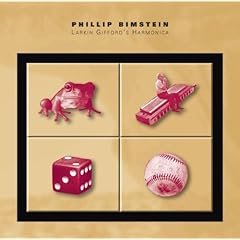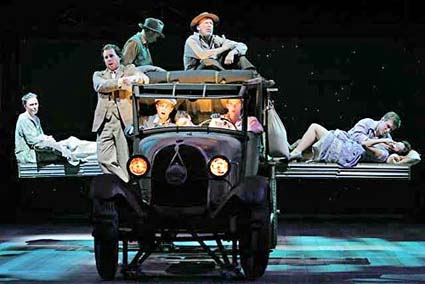 Speaking of great American operas, Tobias Picker has written two of them; Emmeline, which is an unqualified masterpiece, and An American Tragedy, which I think history will regard more dearly than its contemporary reviews might suggest. Between those two landmarks, Picker wrote a kind of “forgotten” opera called Thérèse Raquin, an epic based on the Zola novel which, like Tragedy, involves an unwanted lover being chucked overboard in favor of a more attractive alternative. Picker’s psychiatrist, if he has one, could probably make something of that.
Speaking of great American operas, Tobias Picker has written two of them; Emmeline, which is an unqualified masterpiece, and An American Tragedy, which I think history will regard more dearly than its contemporary reviews might suggest. Between those two landmarks, Picker wrote a kind of “forgotten” opera called Thérèse Raquin, an epic based on the Zola novel which, like Tragedy, involves an unwanted lover being chucked overboard in favor of a more attractive alternative. Picker’s psychiatrist, if he has one, could probably make something of that.
Thérèse Raquin premiered at The Dallas Opera in 2001 and is now having its New York premiere run, in a revised chamber version prepared by Picker, from Dicapo Opera Theatre.
The opera has three more performances this coming weekend: Friday and Saturday, February 23 and 24, at 8 p.m. and Sunday, February 25, at 4 p.m. Dicapo Opera Theatre is located at 184 East 76th Street in Manhattan, just off Lexington Avenue and directly underneath St. Jean-Baptiste Church.
I haven’t seen Thérèse Raquin yet and don’t have any critical guidance to offer but Picker is one of the very best American opera composers and his music is never less than compelling. Get on down to Dicapo this weekend.
Here’s a message from Rama Gottfried:
//
at last! here it is. tomorrow night::
::envelopes for orchestra::
5 minutes of mercury wobbling in space for a 57 piece orchestra
+ and a stacked concert of works by my extremely talented friends at
the manhattan school of music
friday, 2.23.07 – 7:30p
borden auditorium, manhattan school of music
122nd/Broadway (take 1 train to 116(downhill walk) or 125(uphill))
it will be good, you should come.
*** don’t forget to sit in the balcony, it sounds best from there.
the stairs are just as you enter the hall on both sides.
\\
high 5s to all,
 Props to our amigo Tom Steenland who has been producing great avant-garde recordings on his Starkland label from Boulder for many years now. It isn’t every day that a CD from a small label makes the New York Times but Phillip Bimstein’s Larkin Gifford’s Harmonica caught the attention of Steve Smith, who has livened up the Times immeasurably since he started writing over there. Steve reviewed it yesterday, opining that “… the irresistible charm of Mr. Bimstein’s music has less to do with technology than with his uncanny knack for finding the music of everyday life.” If you prefer, Tom has prepared a spiffy pdf file of the review and left it for you here. Daniel Gilliam reviewed the CD for us here.
Props to our amigo Tom Steenland who has been producing great avant-garde recordings on his Starkland label from Boulder for many years now. It isn’t every day that a CD from a small label makes the New York Times but Phillip Bimstein’s Larkin Gifford’s Harmonica caught the attention of Steve Smith, who has livened up the Times immeasurably since he started writing over there. Steve reviewed it yesterday, opining that “… the irresistible charm of Mr. Bimstein’s music has less to do with technology than with his uncanny knack for finding the music of everyday life.” If you prefer, Tom has prepared a spiffy pdf file of the review and left it for you here. Daniel Gilliam reviewed the CD for us here. Beth Anderson
Beth Anderson Columbia University’s School of the Arts has given
Columbia University’s School of the Arts has given 
 Here’s a programming note to remember.
Here’s a programming note to remember.  Since it’s opera week here at Sequenza 21 and there’s a lot of chatter in the comments about transplanting operas between cultures and Galen has raised the topic of fugues in the invisible YouTube video below, it seems somehow fitting to mention that
Since it’s opera week here at Sequenza 21 and there’s a lot of chatter in the comments about transplanting operas between cultures and Galen has raised the topic of fugues in the invisible YouTube video below, it seems somehow fitting to mention that  Speaking of great American operas, Tobias Picker has written two of them; Emmeline, which is an unqualified masterpiece, and An American Tragedy, which I think history will regard more dearly than its contemporary reviews might suggest. Between those two landmarks, Picker wrote a kind of “forgotten” opera called Thérèse Raquin, an epic based on the Zola novel which, like Tragedy, involves an unwanted lover being chucked overboard in favor of a more attractive alternative. Picker’s psychiatrist, if he has one, could probably make something of that.
Speaking of great American operas, Tobias Picker has written two of them; Emmeline, which is an unqualified masterpiece, and An American Tragedy, which I think history will regard more dearly than its contemporary reviews might suggest. Between those two landmarks, Picker wrote a kind of “forgotten” opera called Thérèse Raquin, an epic based on the Zola novel which, like Tragedy, involves an unwanted lover being chucked overboard in favor of a more attractive alternative. Picker’s psychiatrist, if he has one, could probably make something of that.